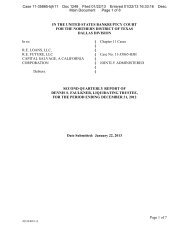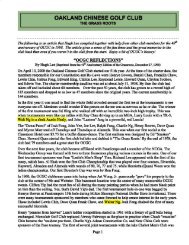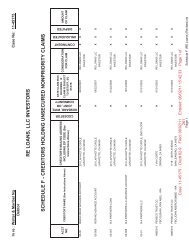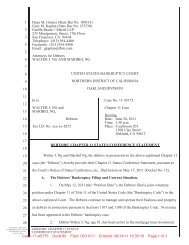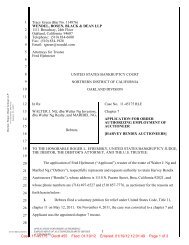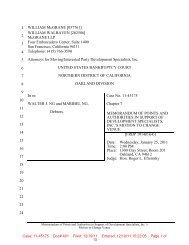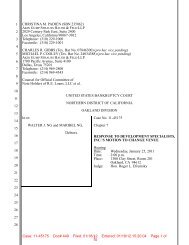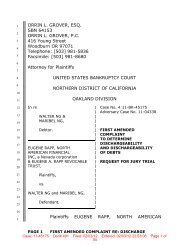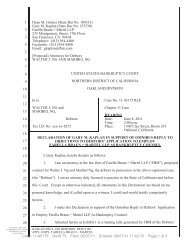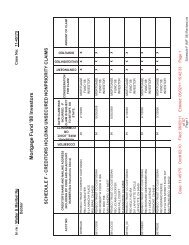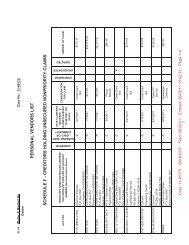Class Plaintiff's Response to Automatic Stay - equitatus
Class Plaintiff's Response to Automatic Stay - equitatus
Class Plaintiff's Response to Automatic Stay - equitatus
Create successful ePaper yourself
Turn your PDF publications into a flip-book with our unique Google optimized e-Paper software.
Case 11-03620-bjh Doc 40 Filed 02/21/12 Entered 02/21/12 23:34:41 Desc Main<br />
Document Page 29 of 34<br />
73. Greenberg claims that the California <strong>Class</strong> Plaintiffs' interests are well represented in the<br />
Deb<strong>to</strong>r's chapter 11 cases because they also are credi<strong>to</strong>rs in those cases. But like the balance of<br />
Greenberg’s arguments, this makes no sense. As explained above, the claims asserted in the<br />
California <strong>Class</strong> Litigation belong <strong>to</strong> the RE Loans inves<strong>to</strong>rs, not <strong>to</strong> RE Loans itself. As such, those<br />
claims are neither represented nor available for prosecution in the Deb<strong>to</strong>rs’ chapter 11 cases – just as<br />
the California <strong>Class</strong> Plaintiffs cannot pursue derivative claims, the Deb<strong>to</strong>r cannot pursue direct<br />
claims. Therefore, the California <strong>Class</strong> Litigation claims are not “well represented” in the chapter 11<br />
cases, they are not represented at all.<br />
3. No Public Interest Will Be Served By An Injunction.<br />
74. Finally, there is no public interest served here as the injunction unnecessary <strong>to</strong> protect the<br />
deb<strong>to</strong>r’s ability <strong>to</strong> reorganize. In fact, it would be a great disservice <strong>to</strong> the purposes of the<br />
Bankruptcy Code, <strong>to</strong> allow a nondeb<strong>to</strong>r defendant <strong>to</strong> avoid litigation in this manner. 22<br />
This<br />
Adversary Proceeding is an attempt by Greenberg <strong>to</strong> avoid litigation al<strong>to</strong>gether and has absolutely<br />
nothing <strong>to</strong> do with the Deb<strong>to</strong>r's reorganization. Indeed, at times, Greenberg seems <strong>to</strong> be requesting<br />
that the California <strong>Class</strong> Litigation be permanently, rather than temporarily, enjoined – clearly an<br />
unavailable outcome. 23<br />
22 See, e.g., In re Vitro, S.A.B. de C.V., 455 B.R. 571, 581 (Bankr. N.D. Tex. 2011) (denying non-deb<strong>to</strong>r's request for<br />
injunction, reasoning that "[t]he granting of injunction [under § 105] will disserve the public interest. Extending the<br />
au<strong>to</strong>matic stay or issuing an injunction for non-deb<strong>to</strong>rs contravenes a basic and compelling principle of federal<br />
bankruptcy law. Like the rest of the Code, Chapter 15 focuses on protecting the deb<strong>to</strong>rs, non the non-deb<strong>to</strong>r ..."); see also<br />
In re Zarnel, 619 F.3d 156, 171 (2d Cir. 2010) ("The au<strong>to</strong>matic stay serves a number of purposes: 'providing deb<strong>to</strong>rs with<br />
a fresh start, protecting the assets of the estate, and allowing the bankruptcy court <strong>to</strong> centralize disputes concerning the<br />
estate.'") (quoting MBNA Am. Bank, N.A. v. Hill, 436 F.3d 104, 109 (2d Cir. 2006)) (emphasis added).<br />
23 Even in situations where courts have extended stays <strong>to</strong> nondeb<strong>to</strong>rs, the injunctions have been quite limited in time and<br />
scope. For example, In Rickel Home Centers, a case referenced by Greenberg, the deb<strong>to</strong>r sought injunctive relief of a<br />
securities class action against its employees. The court rejected the deb<strong>to</strong>r’s arguments that potential indemnification and<br />
contribution claims would impact the reorganization. 199 B.R. at 501 The court, however, found that discovery would<br />
interfere with the management’s need <strong>to</strong> work on the reorganization in the coming months. Id. As a result, the court<br />
allowed the class action litigation <strong>to</strong> proceed in resolving the motion <strong>to</strong> dismiss and only the deb<strong>to</strong>r was limited in its<br />
participation in discovery and only for a short amount of time. Id. at 501-02. See also Seatco, 257 B.R. at 476 (temporary<br />
injunction of third party litigation against a guaran<strong>to</strong>r of the deb<strong>to</strong>r expired upon an uncured default of deb<strong>to</strong>r <strong>to</strong> plaintiff);<br />
Zale, 62 F.3d at 761 (temporary stay may not be extended post-confirmation <strong>to</strong> form permanent injunction extinguishing<br />
nondeb<strong>to</strong>r’s liability); Chord, 2010 WL 1257874, at *13 (finding stay that was indefinite or conditioned upon conclusion<br />
of reorganization proceeds inappropriate; instead, extending stay six weeks <strong>to</strong> give the deb<strong>to</strong>rs “breathing room” for<br />
management <strong>to</strong> focus on reorganization process).<br />
23



